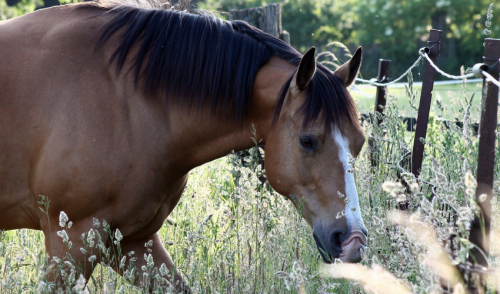{article.name}
Stay Informed
How Often Should I Deworm My Horses?

- Share this:
- Share on Facebook
- Pin on Pinterest
- Tweet on Twitter
Internal parasites are a natural part of horses’ digestive tracts. While different parasites can be beneficial to keep the gut healthy, an overload of worms can cause a wide variety of potentially dangerous problems for your horse. Setting a proper deworming schedule can help keep horses healthy and minimize the risk of spreading worm contamination.
How Horses Get Worms
Horses pick up worms very easily. Mature worms as well as larvae are found in feces, which are dropped in the pasture where the animals graze. Horses ingest the worms back into their digestive tract with the grass they consume, keeping the cycle active. Even if stabled, horses can come into contact with worms through manure that may contaminate feed or bedding.
Several different types of worms are common in horses, including bloodworms, roundworms, tapeworms, bots, and pinworms. Depending on the severity of the infestation and the type of worm, symptoms that your horse has worms may include…
- Appetite loss
- Sudden weight loss
- Dull or poor condition coat
- Lethargy
- Anemia
- Colic
- Fever
- Diarrhea
- Intestinal blockage
In severe cases, symptoms can worsen and could prove fatal. If you suspect your horse has worms, it is best to get a proper veterinary diagnosis to determine the exact type of worms involved and the degree of contamination in order to plan effective treatment. A veterinarian will perform a fecal examination or blood test to check for worms.
How Often to Deworm Your Horse
There is no single, precise schedule for deworming a horse that will work for every animal in every situation or for every type of worm. Traditionally, deworming schedules involved treatments every two months, rotating the types of dewormers to minimize the risk of the parasites building up resistance to the chemicals. Some horses, however, can be kept perfectly healthy being dewormed only in the spring and fall. Other animals may need continuous deworming treatments added to their feed, especially to prevent any reintroduction of worms after the problem has already been treated.
Factors affecting the schedule you should use for deworming your horse include…
- Age: Very young or very old animals may need more frequent deworming, as their internal resistance to contamination is more fragile.
- Health: Horses in good overall condition may need fewer deworming treatments, as they are able to naturally resist the ill effects of worms.
- Herd Size: If you only keep one horse, it may need deworming less frequently than if you have several animals that might inadvertently be contaminating each other.
- Pasture Condition: A dirty, small pasture is more likely to harbor larger concentrations of worms than a larger field that is properly treated to minimize parasites.
- Climate: Worms thrive in warm, moist environments, and horses in colder, drier climates are less likely to need frequent deworming.
- Exposure to Unknown Horses: If your animal is in contact with unfamiliar horses at shows or boarding facilities, more frequent deworming treatments may be desirable.
Keeping Your Horse Worm-Free
In addition to establishing a good deworming schedule for your horse, it is important to take simple steps to minimize worm contamination. This will allow you to use deworming treatments less frequently so the parasites do not become resistant to the dewormers. To keep your horse worm-free…
- Harrow the pasture regularly to break up manure and allow it to dry out and kill any worms or larvae in the field.
- Mow the pasture often to expose manure and worms to stronger sunlight and drier conditions that are less suitable for worms.
- Dispose of manure in an area away from where your horse will feed or graze to minimize the risk of contamination.
- Rotate pastures every few weeks if possible, leaving each pasture unused for 6-8 weeks before reintroducing horses.
- Keep fewer horses in each field at once so there is less manure and less cross-contamination between animals.
- Use elevated feeders so your horse’s feed is not in contact with the ground and any nearby manure where it may become contaminated.
By creating a deworming schedule that meets your animals’ needs and taking steps to keep your horses worm-free, you can easily control these pesky parasites and ensure your horses are healthy throughout the year.
Special Offers
We are constantly adding new specials to our site. Be sure to check back often!


Comments